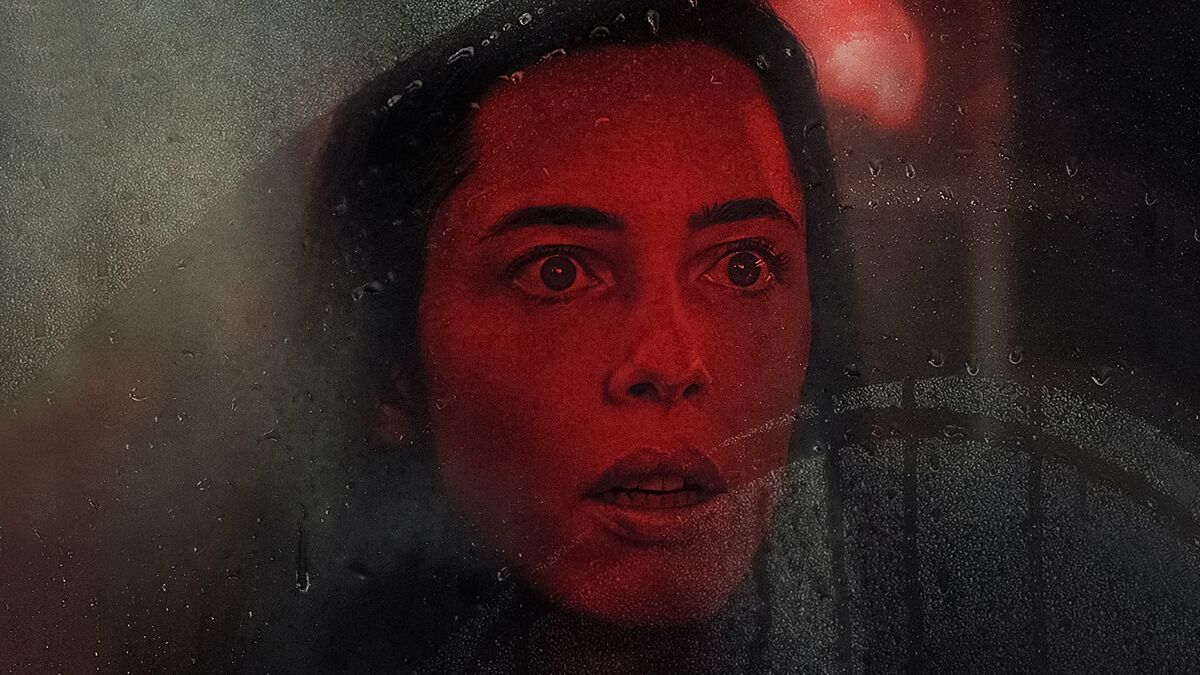Rebecca Hall is so, so good in The Night House. She plays Beth, a woman who just lost her husband to suicide, and her odysseys across the spectrum of grief are astoundingly real. When she gets home at the beginning of the movie—ostensibly from a funeral—you can feel past her façade. You can hear the screams of anguish behind her eyes. She roams her house with a despondent hesitancy, afraid to size up how the space will accommodate just one. It’s a performance that recalls her equally exquisite work in Christine, one of the toughest excavations of depression in modern cinema. Hall’s body speaks the language of misery with holistic fluency. Unlike Christine, however, The Night House has Hall shift her register before the depressive singularity takes over—it’s hard to stay mournful when your dead husband is calling.
When she answers the phone, her voice shakes with an authenticity that’s too often missing from psychological horror. A lesser actor would lean into shock, echoing the viewer’s reaction to the laws of mortality being broken. But Hall is resolutely grounded. There’s shock, sure, but there’s also anger—the only rational explanation is a cruel joke. As her mind races past rationality, there’s a glimmer of excitement, too. There’s hope, disappointment, fear, and relief, all at once, and Hall only needs one line to crash these feelings into each other with such force that they’re inseparable: “who is this?”
READ ALSO: ‘Permission’ puts love and good filmmaking to the test
Her caller ID says it’s Owen, who just days ago took his boat out on the lake and shot himself through the mouth. If it weren’t for a recent uptick in strange phenomena, Beth probably wouldn’t believe it. But she’s finding things: bloody footsteps on the dock, silhouettes in the shadows, and most troubling of all, voyeuristic photos of other women on her husband’s laptop. Beth latches onto the idea that her husband had a secret life, and—just maybe—an afterlife to follow that. Despite the pleas of her worried friends, investigating the mystery becomes Beth’s sole mission. Central to her inquest is the appearance of a house across the lake where there was previously only forest—a house that’s a perfect mirror image of hers.
Director David Bruckner has a great sense of the power of the image. He has a proclivity for close-ups, sometimes of faces, but mostly of objects that disturb by virtue of their context. By itself, a close-up of the stairs leading down to the dock would just flesh out the setting; in the context of Owen’s suicide, it becomes the last footsteps on dry land—a chilling exit door to oblivion. Close-ups of Owen’s possessions turn them into totems of calcified grief. The Night House knows how horror is built into the architecture of our lives, how it seeps into the cement once it’s let inside. As Beth’s search for answers leads her deeper into the doppelgänger house, Bruckner rearranges it into a catacomb of dread, twisting the ordinary into the deeply unsettling just by changing the angle. This is the kind of horror that strips your own bedroom of its safety. Hiding under the covers only thickens the darkness.
As with Bruckner’s previous film The Ritual, though, he’s working from a screenplay that betrays his sensibilities. The film’s opening hour trades in fear at its most primal: unsure, inexplicable, unknown. Something unfathomable led to the lonely, violent death of a loved one, and that same something cracked open the jaws of their corpse. Do you listen to the voice emanating from their skull? There’s some potent subtext here about the tenacity of depression—its ability to keep tearing down from beyond the grave. But for a film that so deftly utilizes the unknown, we’re given far too many answers, crowding up the space for subtext until all that’s left is a neat explanation. The truth behind Owen’s death and Beth’s haunting remains paranormal, but it’s such an unambiguous paranormal that it’s hard to remain a metaphor for anything. A lurking ghost can symbolize depression, but a ghost that throws half-chewed turkey bones at you every Thursday is probably just a guy who choked on a turkey bone on a Thursday. The potential for symbolism is squashed by the story’s specificity.
It weakens the true horror, and in the case of The Night House, it also offsets the carefulness with which the story handled suicide. If the tone of the movie’s first half can be compared to discovering a loved one’s body—a harrowing thing indeed—then the second half is the nosy friend asking exactly how it happened. Some autopsies are better left unperformed.
★★★½ (3.5/5)




